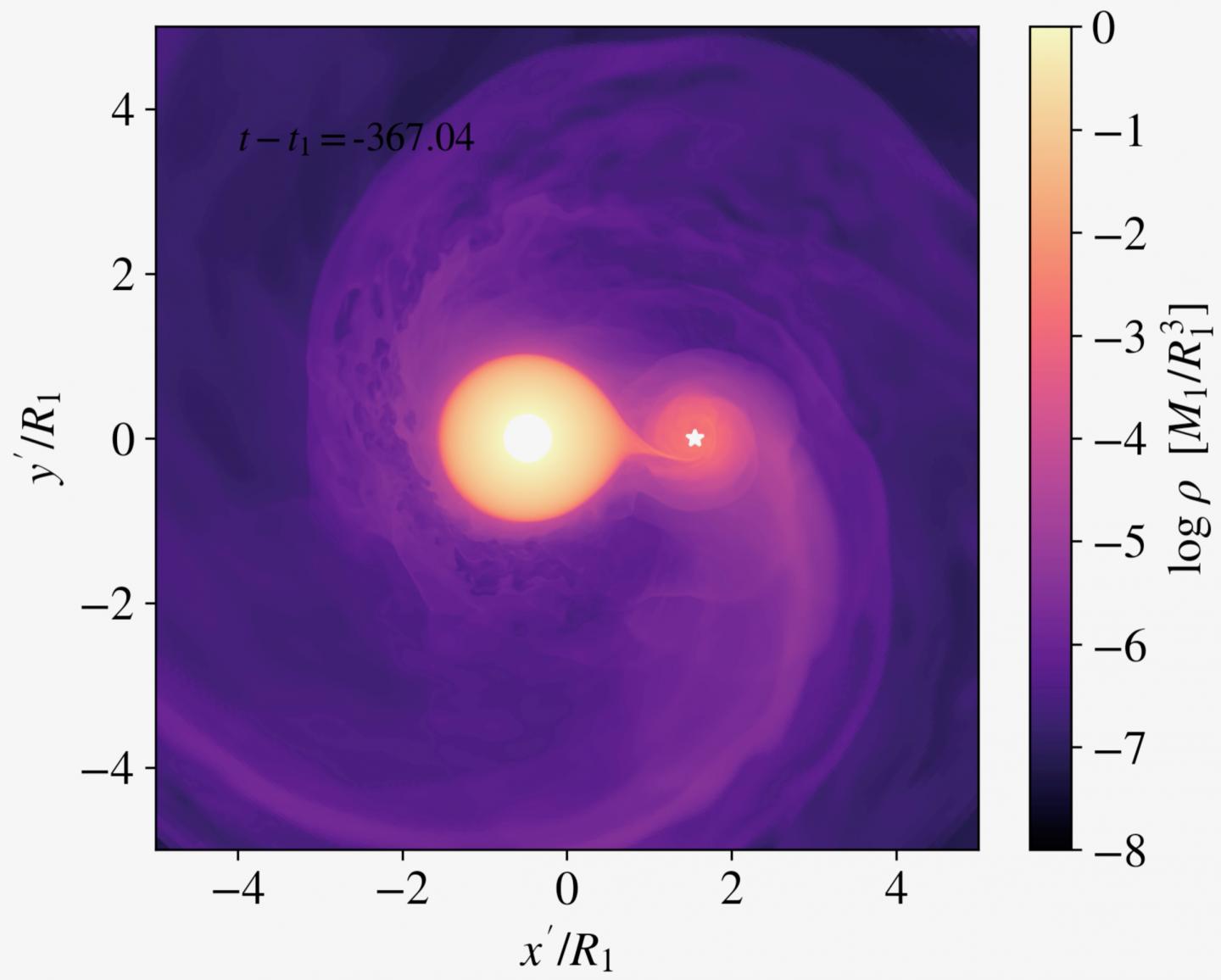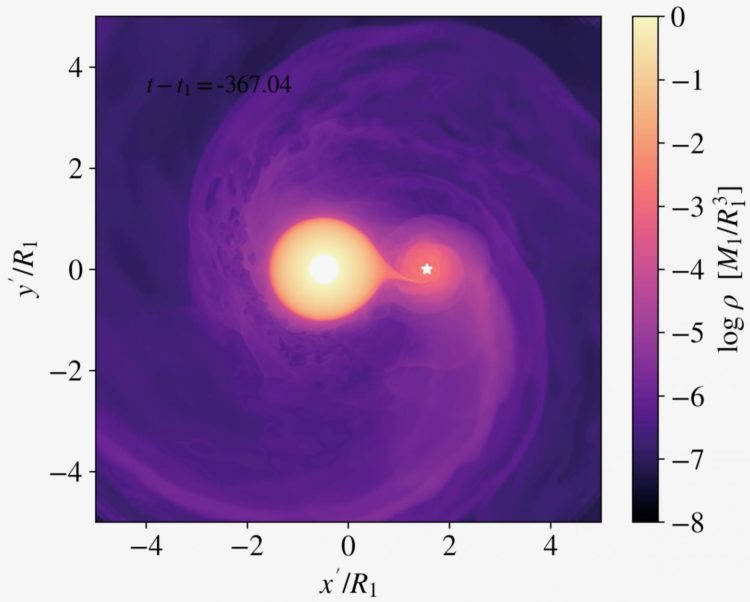James M. Stone, professor of computational astrophysics at the Institute for Advanced Study, heads IAS project on the Dynamics of Neutron Star Mergers, Star & Planet Formation, and the Interstellar Medium

Credit: M. MacLeod (CfA) and J. Stone (IAS)
Schmidt Futures has awarded $1 million to the Institute for Advanced Study (IAS) to leverage advances in high-performance computing to understand challenging astrophysical problems. The project, led by James M. Stone, Professor in the School of Natural Sciences, seeks to deepen our understanding of various cosmic phenomena, including neutron star mergers, star and planet formation, and the dynamics of the interstellar medium in galaxies such as our own Milky Way.
“Computational astrophysics continues to revolutionize the way scientists glimpse and interpret our universe, and Jim Stone is driving some of the most cutting-edge research in this field” stated Robbert Dijkgraaf, Director and Leon Levy Professor. “The Institute is proud to recognize this important investment by Schmidt Futures in a project that promises to bring humanity closer than ever to stars in their finest detail.”
Stone’s work harnesses advances in numerical algorithms and high-performance computers to model and interpret the dynamics of astronomical systems. There is a wealth of data available that guides the work: from gravitational wave astronomy to newly discovered exoplanetary systems, unlocking valuable new insights into the fundamental nature of the cosmos.
“Most of the exoplanetary systems discovered to date are very different from our own solar system, challenging our current theory of planet formation,” stated Stone. “Understanding how giant planets grow inside the gas and dust disks surrounding young stars requires numerical models that evolve a dusty, weakly ionized plasma including self-gravity and radiation transfer. I have been working on various aspects of this problem for the past 10 years, and at the IAS I hope to greatly accelerate progress.”
This IAS project is also poised to expand on a currently limited understanding of the properties and internal structure of neutron stars through an analysis of simultaneously detected gravitational waves and electromagnetic radiation associated with gamma-ray bursts produced by the merger of two neutron stars. Stone’s work to understand the underlying physics of these events relies on the improved accuracy and more realistic physics enabled by special-purpose numerical methods. The development, implementation, and testing of these methods represents a core goal of this project.
“We are delighted to support exciting new directions using high-end and sophisticated computing to address very important astrophysical problems,” said Stuart Feldman, Chief Scientist, Schmidt Futures. “Now is the time to understand aspects of planet and galaxy evolution at a deep level with new tools, and Jim Stone is poised to do just that.”
The last aspect of this research seeks to understand the dynamics of the interstellar medium (ISM) and star formation in galaxies such as the Milky Way. The study of the ISM is challenging because of the enormous range of length scales inherent in the problem, from small clouds of dense gas in which stars form, to the disk of the galaxy itself, which is 10,000 times larger. Resolving all these scales simultaneously requires the use of the largest high-performance computer architectures available, capable of approximately 100 million billion calculations per second. “Our existing codes run at 90% efficiency on up to one million CPU cores, and thus are well positioned to take full advantage of emerging exascale architectures,” Stone explained.
Stone is an authority in numerical astrophysics. He joined the permanent Faculty of the Institute for Advanced Study in 2019. His research is focused on fluid dynamics, particularly magnetohydrodynamics and radiation transfer, for which he has developed some of the most powerful and widely used astrophysical codes. He has contributed groundbreaking methods to address some of the field’s most challenging problems, resulting in important insights into the nature of giant molecular clouds, the evolution of accretion disks, the process of planetary formation, and the dynamics of radiation-dominated flows in accretion disks and stars.
The three-year grant from Schmidt Futures commenced on October 4, 2019, for the purpose of championing the world’s preeminent computational astrophysicists to develop tools and study the structure and evolution of various astrophysical systems. This funding will support the hiring of a software engineer and a long-term postdoctoral fellow, both with proven expertise in the field.
###
Eric Schmidt, cofounder of Schmidt Futures, serves on the IAS Board of Trustees.
About Schmidt Futures
Schmidt Futures is a philanthropic initiative founded by Eric and Wendy Schmidt in 2017 to find exceptional people and help them do more for others together. Schmidt Futures knits talent into networks, bets on the most promising ideas through diverse forms of competition and support, and equips people to scale through partners and modern tools. To realize this vision, Schmidt Futures uses a broad set of tools–including gifts, grants, investments and startup activity–for charitable, educational and commercial efforts with a public purpose. One of Schmidt Futures’s major programs, the Schmidt Science Fellows, in partnership with the Rhodes Trust, aims to create a new generation of scientific leaders by giving the world’s best aspiring scientific minds a broader perspective, exposure to interdisciplinary approaches, and the opportunity to make a lasting impact on society. The year-long postdoctoral research fellowship immediately after the fellows’ completion of their Ph.D. in the natural sciences, computing, engineering, or mathematics places them with global scientific leaders and internationally renowned labs in a scientific discipline different than their core area of study. The third cohort of fellows will be announced in 2020.
About the Institute
The Institute for Advanced Study is one of the world’s foremost centers for theoretical research and intellectual inquiry. Located in Princeton, N.J., the IAS is dedicated to independent study across the sciences and humanities. Founded in 1930 with the motto “Truth and Beauty,” the Institute is devoted to advancing the frontiers of knowledge without concern for immediate application. From founding IAS Professor Albert Einstein to the foremost thinkers of today, the IAS enables bold, nonconformist, field-leading research that provides long-term utility and new technologies, leading to innovation and enrichment of society in unexpected ways.
Each year, the Institute welcomes more than 200 of the world’s most promising researchers and scholars who are selected and mentored by a permanent Faculty, each of whom are preeminent leaders in their fields. Of the Institute’s current Faculty of twenty-six, two are Fields Medalists and five are MacArthur “Genius” Fellows. Comprised of four Schools–Historical Studies, Mathematics, Natural Sciences, and Social Science–IAS has produced an astounding record of introducing new understanding and is responsible for undeniable progress across disciplines and generations, from the development of one of the first stored-program computers to the establishment of art history as a discipline in the United States. Among its present and past Faculty and Members are 34 Nobel Laureates, 42 of the 60 Fields Medalists, and 18 of the 20 Abel Prize Laureates, as well as many MacArthur Fellows and Wolf Prize winners.
Media Contact
Lee Sandberg
[email protected]
609-455-4398
Original Source
https:/





